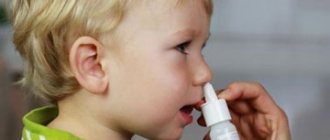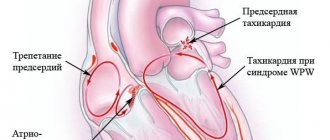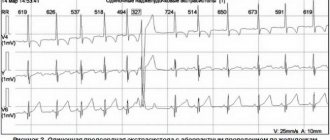Noise in ears - These are auditory sensations observed in the absence of an external sound signal. In most cases, we are talking about subjective tinnitus (only the person himself can hear it), and only sometimes about objective noise (if, for example, the auditory sensation is caused by involuntary muscle vibration, then the doctor can also hear it - using a phonendoscope).
Data on the prevalence of tinnitus vary widely. This is explained precisely by the fact that tinnitus is not recorded objectively. The following experiment was conducted: people who had never complained of tinnitus before were placed in conditions of absolute silence. And 93% of those who took part in the experiment said they heard some kind of noise. On the one hand, we can simply not pay attention to the fact that we have tinnitus, since we live in a constant external sound background (for a city resident, this is a standard situation). On the other hand, in the absence of an external signal, hearing becomes sharper and begins to “read” the noises of the body itself, or the nervous system “makes up” for the missing sounds by generating a signal on its own (at the level of the nervous system this is no longer an acoustic vibration, but an electrochemical process).
How physiological is the sensation of tinnitus?
The causes of constant or periodic ringing in the ears can be pathological. So and physiological. Often people of different ages experience some ringing in the ears in complete silence; such ringing is normal and arises as a result of the functioning of the neurosensory system of the inner ear and cochlear organ. Physiological noise occurs in more than 90% of people, regardless of gender and age. Difficulties in assessing the intensity of physiological noise lie in the subjectivity of the assessment by each individual person. Usually a person adapts to such noise and does not pay attention to it at all, however, with the development of any pathological condition on the part of the neurosensory part of the hearing aid or any other, as well as with some vascular diseases, the intensity of tinnitus can increase significantly, which leads to to the formation of tinnitus symptoms.
Possible complications
Tinnitus may appear without warning, disappear spontaneously, or become chronic.
In addition to constant pulsation, a person may suffer from stress, sleep problems, anxiety or depression. These conditions can cause further deterioration of the heartbeat. Thus, a person finds himself in a vicious circle.
Therefore, it is important to contact a specialist who will help cope with the problem.
If the cause of tinnitus is a heart condition, if left untreated, the normal functioning of the heart can be affected, leading to serious complications over time, including:
- heart failure;
- heart attack;
- sudden cardiac arrest, death.
Pathological causes of tinnitus
A number of diseases can cause tinnitus to increase in intensity. The duration of the ringing can also vary significantly, from rare transient noises to a constant pronounced ringing that causes discomfort in the patient. The most common cause of ringing in the ears is a sharp loud sound, as a result of which the sensory apparatus of the inner ear does not have time to rebuild and adapt to the loud sound, thereby forming a transient or short-term ringing in the ears. Which we've all heard, it's like a squeak. This form is especially common among people who work in loud environments, for example: guitarists, rock musicians, DJs and hosts of festive events. However, severe tinnitus often occurs in one ear and goes away on its own.
The following more serious causes of pathological ringing in the ears can be diseases such as:
- Otosclerosis is a disease in which bone tissue grows in the cavity of the ear canal.
- Infectious and inflammatory diseases of the outer, middle and inner ear.
- Arterial hypertension is increased blood pressure in the vessels of the brain.
- Taking medications with an ototoxic effect.
- Atherosclerosis of cerebral arteries.
- Osteochondrosis.
- Injuries and contusions of the head and hearing organ.
- Blockage of the auditory canal.
All of the above diseases often lead to tinnitus, which becomes a painful companion for the patient. Tinnitus can occur with preserved hearing or be accompanied by a decrease in hearing.
Otosclerosis
If you are bothered by a constant ringing in the ears and head, the causes of which remain unclear, then most likely it occurs due to the proliferation of bone tissue among the structures of the inner ear. This process is called secondary ossification and leads to the gradual formation of otosclerosis. The disease occurs more often in females and does not depend on age. Often, with otosclerosis, patients, in addition to noise and ringing in the ears, experience sensorineural hearing loss.
With otosclerosis, tinnitus is the first symptom and appears much earlier than the development of sensorineural hearing loss and other symptoms, however, the diagnosis of this symptom is much more difficult, since the symptom is purely subjective.
Infectious and inflammatory diseases of the ear
Diseases in which inflammation occurs in the ear are called otitis media. Otitis can be of different localization, and therefore external, middle and internal otitis are distinguished. If you are wondering why there is a ringing in your left ear or why there is a ringing in your right ear, then the cause may be a history of otitis media in the past. Ringing most often results from damage to the inner ear. As a result of inflammation, especially if it is accompanied by a purulent process, disturbances in the hydrodynamic physical parameters of the transmission of sound information are formed. Such changes occur only on the side of the affected ear, which ultimately leads to the unilateral occurrence of the symptom of ringing in the ears. Tinnitus associated with previous inflammation can develop at a young age, and the interval between otitis media and the manifestation of ringing can be very long, it is for this reason that it is important to give due importance to a thorough collection of anamnesis of the disease.
Hypertonic disease
The cause of constant ringing in the ears on both sides can be significantly increased pressure, this is especially true for people over 50 years of age. According to statistics, more than 70% of patients with hypertension have a symptom of tinnitus, and in a permanent form. If the cause of ringing in the ears is arterial hypertension, then you should not delay contacting a specialist for advice and specialized treatment. Typically, tinnitus occurs when blood pressure is high. Moreover, the leading role in this situation is played by the level of systolic pressure, which corresponds to myocardial contraction. Often, ringing in the ears or in a separate ear is associated not only with hypertension. But also with concomitant atherosclerosis of the vascular wall.
Osteochondrosis
Osteochondrosis of the cervical spine is often accompanied by ringing in the ears. The mechanism for the formation of this symptom in osteochondrosis is a significant bending of the vertebral arteries, which feed the pyramid zone and the cochlea of the inner ear. With osteochondrosis, vertebrobasilar insufficiency develops, which is also accompanied by a feeling of spots flashing before the eyes and dizziness. In some cases, with vertebrobasilar insufficiency, tinnitus may precede a short-term loss of consciousness.
Atherosclerosis of cerebral arteries
A constant ringing in the ear on the left side of the head or a similar noise on the right side may indicate serious atherosclerotic changes in the cerebral arteries, namely in the internal carotid and middle cerebral arteries. With the development and progression of atherosclerosis, cholesterol accumulates under the inner layer of blood vessels - the endothelium, which in turn leads to compaction of cerebral vessels and a significant decrease in the elasticity of the vascular wall. Even with moderately elevated blood pressure in combination with atherosclerosis, tinnitus may occur. Particularly characteristic is the one-sided manifestation of noise during the formation of atherosclerotic changes in vessels anatomically close to the pyramid of the inner ear.
Use of medications with side effects
Taking some drugs with ototoxic effects can cause temporary or permanent symptoms of tinnitus. The most common drugs that have such serious side effects include:
- Group of antibacterial drugs of the tetracycline series;
- Some psychotropic drugs - Haloperidol, Levodopa, Nicotine, Marijuana;
- Anti-inflammatory drugs of a steroid nature - Prednisolone;
- Diuretics such as Furosemide (Lasix);
- Cardiac glycosides – Digitalis and non-selective beta blockers.
The use of tetracycline antibiotics in early childhood or non-compliance with dosage can lead to dystrophic changes in the cochlear apparatus and brain nuclei responsible for analyzing sound stimuli.
Blockage of the ear canal
The mechanism of perception of sound stimuli in humans is a complex mechanism in which mechanical and chemical processes are involved. If an obstacle occurs in the path of a sound wave, not only sound distortion may occur, but also noise may be generated due to the resonance mechanism. Any foreign body or substance in the area of the external auditory canal can cause tinnitus. Often noise occurs in children when liquid or solid particles of dust or sand enter the ear. Small insects may also enter the outer ear, which will also lead to the formation of ringing in the ear. With insufficient hygiene and treatment of the external auditory canal, the formation of cerumen plug is possible. Which can also cause noise in the ear on one side.
Master Hearing
This anti-noise medication comes in the form of propolis ear drops that do not contain alcohol. “Master Hearing” has antibacterial and anti-inflammatory effects. The drops are often prescribed for tinnitus and are a 100% natural product that does not cause side effects. “Master Hearing” improves cerebral circulation and accurate transmission of sound impulses. Often these drops are prescribed as a prevention of hearing problems for those who are forced to work in high-noise environments. The minimum course of treatment with Master Hearing is a week.
Master Hearing
Sashera-Med LLC, Russia
A natural remedy that allows you to avoid hearing loss and stop the negative processes occurring in the hearing aid.
The action of the drops is aimed at restoring the cells of the eardrum, the auditory nerve, improving blood circulation and transmission of impulses to the corresponding part of the brain, eliminating inflammation and the source of infection during purulent processes. 5.0 1 review
312
- Like
- Write a review
Types of tinnitus
Despite the fact that the vast majority of forms of tinnitus are subjective, it is still possible to identify objective ones. The objective symptom of tinnitus is that it is audible not only to the patient, but also to the specialist who diagnoses the disease that caused it. Objective tinnitus is quite rare and occurs as a result of gross and pronounced disturbances in the activity of the patient’s cardiovascular system; in even more rare cases, this form occurs with muscle pathology. The nature of the noise helps to distinguish what is causing the ringing in the ears. If the ringing is rhythmic and pulsating, then most likely the noise is generated by a vascular component; in the case of a crackling noise, it is generated by a muscular component.
Much more often in the practice of otorhinolaryngologists we encounter a subjective form of tinnitus, the differential diagnosis of which is a much more serious task. The patient's answers help in diagnosis. Since a number of diseases are characterized by either constant noise, or periodic or transient noise, the situation is similar with the localization of the process, which can be unilateral or bilateral.
Vinpocetine
A very effective drug for tinnitus, aimed at improving blood circulation in the brain, stimulating metabolic processes, concentration, and improving memory. Vinpocetine has a beneficial effect on blood rheological parameters. It is prescribed for hearing loss, Minière's disease and tinnitus. In reviews, patients write that Vinpocetine is no worse than the expensive drug Mexidol. The doctor determines the duration of treatment and dosage of the drug. With long-term use of Vinpocetine, some patients report dry mouth and headaches. At the same time, the medicine is quite affordable, and its effectiveness has been confirmed. Contraindications: age under 18 years, low blood pressure, etc.
Vinpocetine
"Moskhimfarmpreparaty" named after. N. A. Semashko, Russia; ALSI Pharma, Russia; Biocom, Russia; Izvarino Pharma, Russia
Neurology: symptomatic treatment of the consequences of ischemic stroke, vascular vertebrobasilar insufficiency, vascular dementia, cerebral atherosclerosis, post-traumatic, hypertensive encephalopathy.
Ophthalmology: chronic vascular diseases of the retina and choroid. Otology: perceptual hearing loss, Meniere's disease, tinnitus. from 29
5.0 1 review
989
- Like
- Write a review
Character of the ringing
Questioning a patient who complains about this symptom helps in diagnosing the underlying disease that caused it. To determine the disease, an otorhinolaryngologist asks the patient leading and clarifying questions to determine the nature of the ringing.
- A monotonous noise resembling a whistle, hissing, squeaking or buzzing.
- Multicomponent noise - resembles the ringing of a bell, voice timbre, and various musical elements.
Noise can be of vibrational or non-vibrational nature, which directly affects the nature of the noise.
- Vibration ringing - occurs mechanically due to the anatomical formations of the inner ear and cerebral vessels. This noise may be objective.
- Non-vibrational - always subjective, occurs as a result of improper functioning of the conductive nerve fibers in the central nervous system. May occur with mental disorders.
Ringing degrees
Despite the difficulty of assessing the intensity of tinnitus, this symptom can be determined by the degree of noise intensity. Russian otorhinolaryngology has developed its own classification of noise intensity, thanks to Academician of the Russian Academy of Sciences I.B. Soldatov. This classification includes 4 degrees of tinnitus intensity and reflects the practical significance of this symptom.
- Degree. At this degree, the patient easily tolerates noise, it does not affect the general condition and well-being of the patient and is noted only in the quietest conditions.
- Degree. The patient experiences frequent distractions by noise in quiet areas or at night. In some cases, there is difficulty going to bed.
- Ringing in the ears constantly bothers the patient, as a result of which the patient’s behavior is disrupted. He becomes irritable, the emotional background is constantly tense.
- The patient experiences unbearable noise, which almost completely deprives him of sleep and makes daily activities difficult. The patient's ability to work is significantly reduced.
This classification, despite all the subjectivity, allows you to most effectively assess the severity and degree of ringing in the ears, which turns out to be very valuable in the rational planning of treatment measures and the elimination of this symptom.
Diagnostics
Diagnosing the symptom of tinnitus is important. Since the symptom may be associated with serious diseases. The intensity of the noise and its location, as well as its duration, are important in diagnosis.
Ringing in the right ear causes and treatment
In this case, the ringing is most likely associated with diseases such as otosclerosis, otitis interna, the presence of a foreign body in the outer ear on the right side, or damage to the cerebral vessels. Ringing in the right ear can be constant or periodic; the periodic appearance of a symptom speaks in favor of the vascular component of the disease, for example, in atherosclerosis and hypertension, but constant noise speaks in favor of otosclerosis and disorders of the nervous system. Why is there a ringing in my left ear? The reasons will be the same as with the right one. To clarify the diagnosis, the specialist will necessarily collect an anamnesis, examine using otoscopy, and determine bone conductivity using a special medical tuning fork. To clarify the diagnosis, special additional research methods are sometimes required, such as:
- Magnetic resonance and computed tomography - allows you to determine the degree of damage to the anatomical structures of the inner and middle ear;
- Tone threshold audiometry - in this study, an audiogram is compiled, which can be used to judge the degree of perception by the central nervous system of various sound stimuli;
- Angiography of cerebral vessels - allows you to determine the degree of damage to the arteries.
Often, to establish an accurate clinical diagnosis, it is sufficient to determine the accompanying set of symptoms that help in differential diagnosis.
What preventative measures will be required?
To protect yourself from such an unpleasant phenomenon as pulsation in the ear, you need to take the following preventive measures:
- Maintain good ear hygiene.
- Use headphones with caution.
- Organize daily walks.
- Protect your ears from infections.
- From autumn to spring, wear a hat and scarf.
- Protect yourself from drafts and hypothermia.
- Give up bad habits.
Following these recommendations will help you maintain your health.
Treatment for tinnitus
Since tinnitus is just a symptom of some other disease, it makes no practical sense to get rid of it alone. It is important to start fighting the underlying disease that caused it. Depending on the disease, the treatment will be completely different. However, regardless of the cause of the noise, there are some general principles for treating tinnitus. A number of medications are used to treat tinnitus:
- Nootropic drugs;
- Angioprotective drugs;
- Anticonvulsants;
- Antihypoxants and antioxidants;
- Antihistamines;
- Drugs affecting cerebral circulation.
In addition to medications, a mandatory component of conservative therapy is the use of physiotherapeutic procedures.
Nootropic therapy
The use of nootropics allows you to increase the metabolism of brain neurons, which improves the functioning of the neurosensory apparatus of the inner ear and pathways. In medical practice, drugs such as Piracetam, Phezam, Cortexin are used. Nootropic therapy helps elderly patients with a predominance of dystrophic processes in the central nervous system.
Antihistamines
They help fight if the cause of tinnitus is an inflammatory process occurring in the inner ear or in cases where noise is associated with increased sensitivity of body tissues and the occurrence of allergic changes localized in the middle and inner ear.
Anticonvulsants
Prescribed in cases where tinnitus is caused by a vibrational muscle component. Stopping the clonic contraction of the muscles of the soft palate or the muscles of the middle ear can effectively combat vibrational tinnitus. For therapy, drugs such as Difenin and Konvulex, as well as their analogues, are used.
Antihypoxic and antioxidant therapy
With pronounced trophic and degenerative changes in the inner ear in elderly people, the use of antihypoxants and antioxidants helps alleviate the symptoms of tinnitus, and also slows down the progression of degenerative disorders in the inner ear, improving its blood supply.
Drugs that increase cerebral circulation
As a result of age-related changes in older people, the vessels become less elastic, and the thickness of their walls increases, which reduces the degree of perfusion of the tissues of the inner and middle ear. To combat atherosclerotic changes in the cerebral arteries, the following drugs are used: Cavinton and Vinpocetine.
Aminazine
This drug is an antipsychotic with a sedative effect. Aminazine reduces psychomotor agitation. The drug is prescribed for many problems, including Minière's disease and tinnitus. "Aminazine" relieves restlessness and anxiety, and also reduces physical activity. You can buy Aminazine in tablets and injections with a prescription. This drug is prescribed infrequently and in very small dosages. Aminazin has a lot of contraindications, so it is taken under the strict supervision of a doctor, only in complex therapy.
Aminazine
PJSC Valenta Pharm, Russia
Chronic paranoid and hallucinatory-paranoid states, states of psychomotor agitation in schizophrenia (hallucinatory-delusional, hebephrenic, catatonic syndromes), alcoholic psychosis, manic agitation in manic-depressive psychosis, mental disorders in epilepsy, agitated depression in patients with presenile psychosis, manic depressive psychosis, as well as other diseases accompanied by agitation and tension.
Neurotic diseases accompanied by increased muscle tone. Persistent pain, incl. causalgia (in combination with analgesics), persistent sleep disorders (in combination with sleeping pills and tranquilizers). Meniere's disease, vomiting in pregnancy, treatment and prevention of vomiting during treatment with antitumor drugs and radiation therapy. Itchy dermatoses. As part of “lytic mixtures” in anesthesiology. from 141
577
- Like
- Write a review
Practical advice
If you experience ringing in the ears, and even more so it bothers you and interferes with your activities, you should not delay in contacting a specialist for professional help, otherwise you may miss the progression of a serious disease that may be accompanied by ringing in the ears. Only a specialist - an otorhinolaryngologist will be able to accurately determine the cause of tinnitus and plan subsequent treatment. By the way. Following the advice of your doctor is a prerequisite for effective relief from an unpleasant symptom. Take care of your body and health, be happy!
Nervous system diseases
There are a lot of them! This includes multiple sclerosis, meningitis, epilepsy, and a consequence of age-related changes (such as Parkinson's disease)... Dozens of diagnoses, many of which are very serious, but they still need to be made. Noise, humming and whistling in the ears are therefore important symptoms. If they bother you or your loved ones, and the therapist or other specialist to whom you turned for help “waves it off”, saying that it’s tinnitus, a sound for no reason... perhaps you should first look for a more meticulous doctor. There is always time to decide that the sounds come from nowhere and are harmless.
By the way, frequent stress and overwork lead to problems with the nervous system. Maybe before you get an appointment, you should try to at least get some rest? Take a time out, be quiet and in nature. If the intrusive sounds disappear at this time, you are on the right track. Stress less and rest more. You can ask your doctor to prescribe sedatives, but this is not necessary.










